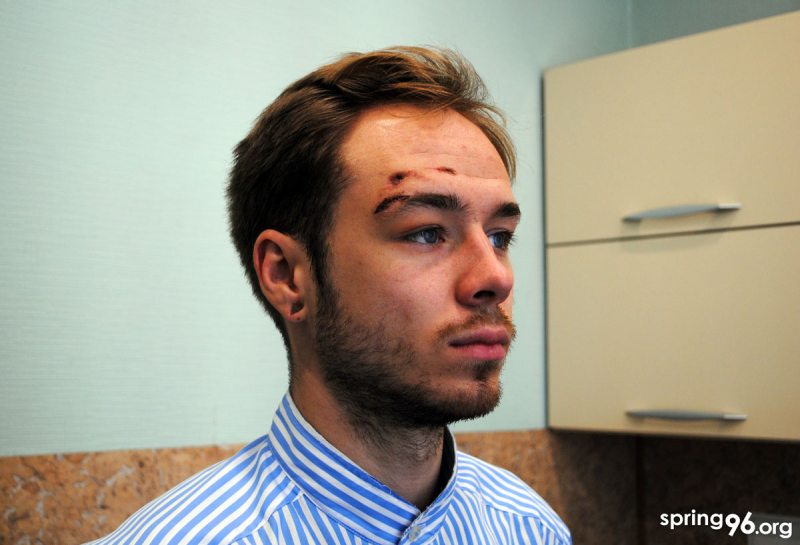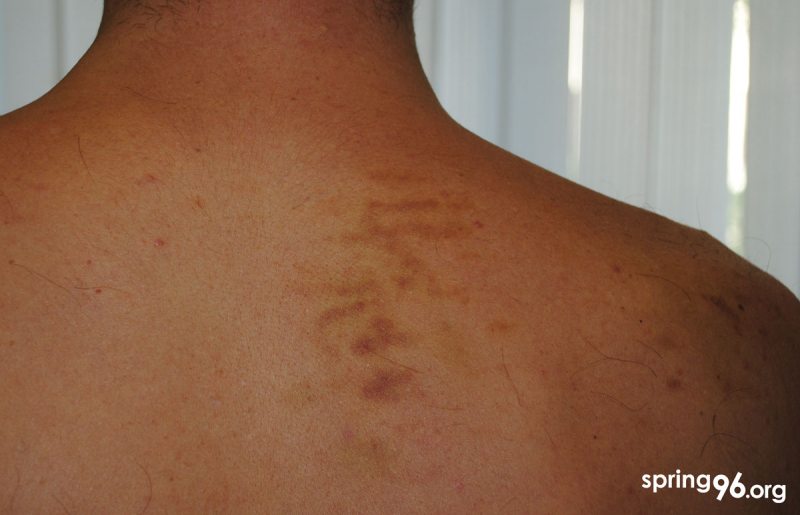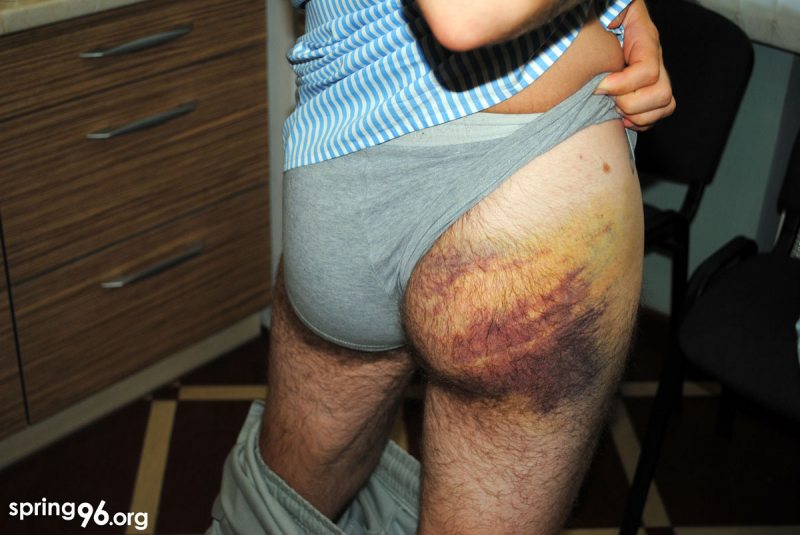“We were trampled in the police bus.” Survivor stories
The Human Rights Center “Viasna” and the World Organization Against Torture (OMCT) launched a campaign to document cases of torture, cruel, inhuman and degrading treatment of protesters on August 9-13. Some testimonies of people who survived torture and violence will be published on our website as evidence of crimes committed by security forces.
23-year-old Yury Panamarou was detained in the evening of August 11 on his way to a street food market in central Minsk. He told Viasna about the cruelty of his unjustified detention and the conditions under which he was kept for two days in the detention center in Akrescin Street.
“I hate runners”
"I was with my friends. On the opposite side of the street, we saw a minibus with blacked-out windows and without license plates. There were riot policemen inside. We started running and they went after us. Everyone ran away, except me. I was hit in the back and fell to the ground. I told them, “Guys, I’m not running away, I will not resist.” Then they cuffed my hands with a plastic clamp band and threw me into a van, shouting, “I hate runners.” They immediately started beating on the body and on the backs of my legs. There were three or four blows with a truncheon on the calves, then on the buttocks, and on the body. I was lucky to be the first to be thrown into the bus. A minute later, another guy was thrown on top of me, and it was him who got beaten, not me. They smashed his head. He was lying on me, his blood was dripping, there was his blood all over my shirt. Then another was thrown inside, and they asked, “How much do you get paid? Do you want change?!” And they kept beating him as they were saying this.”
Yury says that after the minibus he was put into a police van, where everyone was ordered to lie face down:
“They didn’t give their names. And I couldn’t see their officer patches. Then they threw us into a cage inside the bus and started trampling us. The four of us were stuffed into one cage, which is designed for one person. We were driven around in this bus for two or three hours until it was crammed full. Another detainee with a broken head got sick and lost consciousness. We knocked and told them about the guy, but they only said that he was an “agitator” and slapped him, instead."
One guy was pushed under a small bench in the bus. He was told to “sit under the bunk”. He was kicked there and four others were thrown on top of him.
“You’d better help normal guys, not these sheep”
“There were two women in the neighboring cage. One of them was a doctor who was coming home from work. When she said that she was a doctor, they replied, “So you are helping these agitators, these Nazis. How much do you get paid? You’d better help normal guys, not these sheep”. Nobody believed her.”
“They sprayed pepper gas at a woman’s face”
Yury says that the personal belongings were searched during transportation.
“My belongings, a briefcase with a bottle of water, a sheet and a swimming mask, remained in the minivan. I couldn’t find it later, in the bus. It simply disappeared. They searched one woman and found a pepper spray. The person who searched her things said, “I know what it’s for”. And he just sprayed the mace at her face. The gas reached us through ventilation and we also began to choke. And that woman, she just could not breathe. When they learned later that she was really a doctor, they asked her for help, “Here, I sprained my arm in a protest”. And she helped them."
“A guy standing next to me asked if he could wipe the blood on my clothes”
It wasn’t until the next morning that Yury and other detainees were taken to the Partyzanski district police department.
“When we were brought in, they immediately started shouting, “Face to the floor!”. There was a lot of obscenity. They tossed us as if we were balls. They kept yelling, “Faster! Move it!”
I was thrown out of the police bus, but I could not feel my legs, I said I could not get up. One of them picked me up and another kicked me. And since my hands were cuffed, I smashed my head against a tiled wall and my eyebrow was hurt badly. Blood was flowing from it. But I lay down face down, on my knees, legs crossed. Then we were sent to a basement with a concrete floor. There we were laid face down on the floor and we lay there until the riot police left.
We stood crammed with our hands tied. It was stuffy. I was wet all over. A guy with blood on his head who was standing next to me asked if he could wipe the blood on my clothes. One guy there just had his head cracked and they beat him all over his body. It turned out that he was confused with some coordinator.”
Yury said that police officers in the Partyzanski police department wore black clothes and balaclavas.
“They removed the clamp bands from our hands. They said we could sit as we wanted, but only facing the wall. Then we were taken to standard procedures: we were photographed and our things were taken. We were only allowed to use a bathroom outside after there were at least ten of us. Then they even brought metal benches so that those who were sick could sit down.”
“Shout that you love riot police”
Yury says that they did not sign any documents. They were not even shown any detention papers. They were taken to the police department at about midnight and they were kept there until noon. Then they were all taken to the detention center in Akrescin Street. People were brutally beaten there, Yury says.
"The guards who came to pick us up did not beat us. They just shouted, “Faster! Faster!” In the detention center, we were chased with sticks, but not beaten hard. We were put into a room measuring 10 by 10 meters. There was a lattice instead of a roof, a concrete floor and concrete walls. Seventy people were stuffed inside. A person was brutally beaten under our cell. We were told that before they started beating him they told him, “We will now show how to love riot police.” Then he was brutally beaten, and he shouted accordingly. They told him, “Shout that you love riot police.” And he shouted. And they said, “Shout louder, louder!” He just shouted in agony. Then he fell silent. And we realized that something had happened to him. They beat him under our cells to let us hear it."
“The one who was the coldest stood in the center”
“At night there were more screams, but from more remote cells. We spent the night in summer cells. During the day, they did not give us any food or water, did not let us go to the bathroom. The evening shift was more loyal. The officers took us to a cell with other people, where there was a toilet and water. We spent the night there. There were a lot of guys in light clothes, because many were detained during the day, and they were cold at night. We were standing in circles. In the center was the one who was the coldest. He was covered with a circle of 4-5 people, and then another circle was pasted. This is how we warmed up. And when we wanted to sleep on the concrete floor, we took off our sneakers, put them under our tailbones and sat back to back, with our legs doubled up. In this way, our backs were warm. But I could not sleep at all. We could only sleep for 20 minutes, then we froze and got up. It was possible to sleep a little when the sun rose and it was already a little warm”.




















